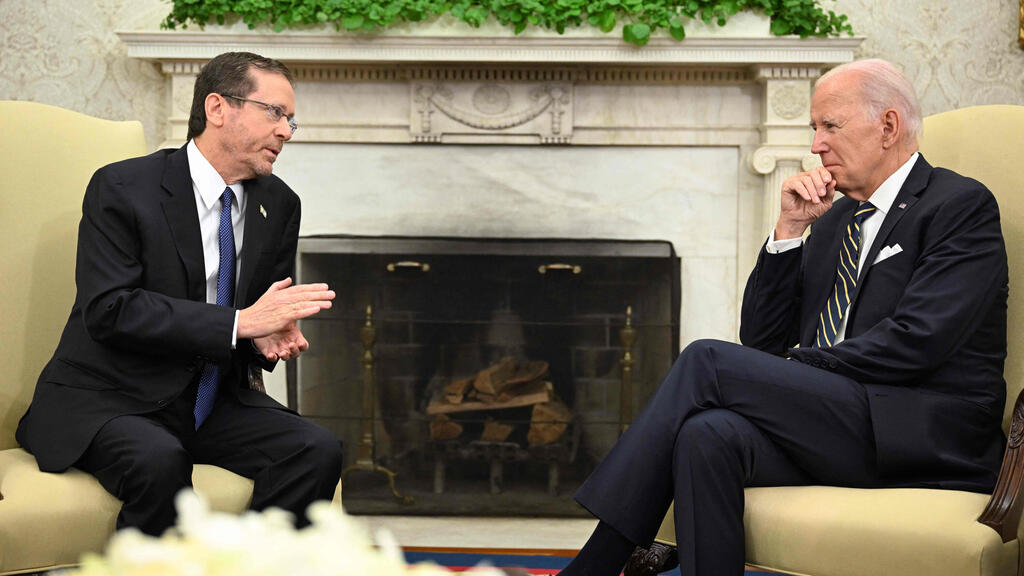Getting your Trinity Audio player ready...
Biden-Herzog meeting
(Reuters)
President Isaac Herzog arrived at the White House on Tuesday evening for an Oval Office meeting with U.S. President Joe Biden in the Oval Office. At the beginning of the meeting, Biden told Herzog, in front of the cameras: "You know that my love for Israel is deep. This is an unbreakable friendship."
Biden, who read his statements from a piece of paper, referenced his conversation yesterday with Prime Minister Benjamin Netanyahu: "As I told Netanyahu, the US commitment to Israel's security is ironclad."
In contrast to Biden who did not directly address the judicial overhaul, Herzog did address it in the public part of the meeting and said that the controversy in Israel only testifies to the "greatness of Israeli democracy" and stated that he and Biden would discuss "all issues," including the current controversy over the judicial overhaul.
According to Herzog, the cooperation between Israel and the US is only increasing and that "our enemies do not understand the dispute in Israel correctly." Herzog thanked Biden for his "friendship" and added: "Democracy is strong. I believe we need to seek a broad consensus and I agree with you on that. I continue even now to find solutions to get out of the crisis."
Following the hour-long meeting, Herzog told reporters that his conversation with Biden was "wonderful" and emphasized that calls from Biden and his administration to reach a broad agreement around the judicial overhaul – an agreement that Herzog has tried to promote without success so far comes "not to upset, but out of deep concern."
Herzog added that this should be an additional "consideration" when it comes to "our need as a nation at these very moments to reach understandings and agreements and dialogue - because in the end Israel is very important to the world, to the region and to the US. This should be a consideration for our brothers and sisters in Israel." He described the American president as "a lover of Israel, a pursuer of peace and a supporter of her security."
Herzog and Biden had been set to discuss a series of political, security and economic issues at the meeting, as well as the issue of the judicial reform legislation promoted by the government in Israel. The Biden administration which has repeatedly called for judicial reform to be undertaken with "the widest possible consensus," an agreement that Herzog himself tried to achieve without success.
Herzog's very invitation to the White House, instead of Prime Minister Benjamin Netanyahu, was seen as a message from Washington against the conduct of Netanyahu and his government - which Biden in an interview earlier this month called "the most extreme" he had ever seen in Israel. At the same time, on Monday Biden spoke with Netanyahu for the first time in four months and the two even agreed to meet, although it is not clear if the prime minister will indeed be invited to the White House or if the meeting will take place on the sidelines of the United Nations General Assembly in September - as a senior political official claimed this evening , shortly before Herzog's meeting with Biden.
WHAT IS ON THE ISRAELI PRESIDENT’S AGENDA?
(ILTV)
Netanyahu himself implicitly referred to tensions with the US on Tuesday evening , saying at the state memorial ceremony to mark the 83rd anniversary of the death of Zeev Jabotinsky: "Like Jabotinsky, who believed that the Jewish state's natural alliance was with the Western powers – so we believe that our first and most important alliance is with the US." However, he emphasized, "We always remember that the ultimate responsibility for our destiny and our security lies with us – with the sovereign Israeli government in Jerusalem." At the same time, and as part of the "Day of Disruption" protests against the judicial reform, thousands participated this evening in a demonstration in front of the US Embassy in Tel Aviv.
First published: 20:52, 07.18.23






